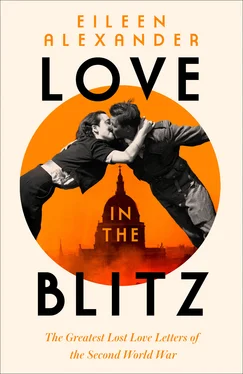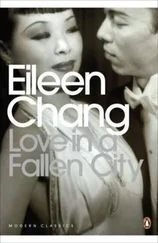(By the way, I hope our Aubrey is safely back from Geneva.8 Joyce has had two post-cards from him since he left England. I have had one letter – which of us is better off? It is hard to day. I wrote him a very silly letter, to which I have not, as yet, had any answer – but I hate to think of him perishing in a mined Swiss Mountain Pass – or being drowned by conquering Nazis in Le Lac Léman. Oh! dear, what a woeful thought.)
Wednesday 29 August If there is no war, we leave here next Tuesday evening and hope to arrive in London on Wednesday morning – (bless we the Lord. Let’s praise & magnify him for ever, if we are able to proceed according to plan). Excavations on my tooth are scheduled to begin on Thursday 7th – but I don’t think my chin will be quite itself again in time for Ismay’s wedding. It is getting paler – but slowly. Eventually I think it will disappear altogether (I mean the redness – not (I hope) the chin!) but not for some time, yet.
Friday 31 August Your letter has just arrived, Gershon. Your reprimand was more than justified and, in the circumstances most kindly expressed. From now onward, the expression ‘I shall never be the same again’ will be wiped from my epistolary slate for ever, though it is only fair to warn you that, after taking this drastic step, I shall never be quite the same again! And there is a condition attached. ‘Sweet-darling’ must be immediately erased from your vocabulary. It does not suit you – or me – and it is not funny.
I thought, like you, that we had the Führer in a corner – but now I don’t know. I don’t understand anything, & I want to say – I’m glad you only feel a healthy glow. My inside is now minced as well as mashed. Thank you for your solicitous advice about what I should do in the event of war – (in this, you and my parents are at one – we have established an armed neutrality on the subject – there’s no point in arguing with them until I hear from Miss Sloane). I could not possibly stay here more than a week or two if there was a war. I am perfectly healthy now – but in a very dangerous state of restlessness because I have nothing to do. When I say dangerous, I mean that I haven’t forgotten that nine weeks ago I was sure I was going mad, (this state of mind was only indirectly due to the accident – ever since I was eleven or twelve, at all times when my mind was not fully occupied with work which was tough & impersonal, I have watched myself fearfully for signs of a lack of mental equilibrium – I don’t know why – I just did) and unless I have some very definite and absorbing work to do, soon – I shall get worse.
I had a letter from Jean this morning. She has been mobilized – at which she is not amused – nor am I, for that matter. As a member of the auxiliary air force, she will spend the entire duration of any war training recruits at humming aerodromes all over the country. She is the only one of my 52 first cousins (except Victor, whose face I slapped, but with whom I am very friendly for all that – which, on the whole is magnanimous of him) of whom I am really fond. Victor is in Corsica – no-one quite knows why – but he’s like that. I fancy, if there’s a war he’ll have to stay there. As he has literary aspirations, he will probably write a book – after all Boswell did.
Now that Ismay’s wedding is post-poned, (sorry – wrong word – I mean now that it is a ‘fait accompli’) I presume that we shall not leave Clunemore on the 5th, unless something absolutely definite happens one way or another before then – but I don’t know. If the status quo is maintained, during the next few days, perhaps you would very graciously go on writing to this address – also, if war breaks out. If anything unexpected happens in the way of a Peace conference or the like – then I expect my address as from Tuesday, 5th will be ‘The Mayfair Hotel, Berkeley Square, London W1’ (Note the forward manner in which I now just take it for granted that you are going to write to me! Oh! Indubitably, I am not what I was! Hubris again, Eileen – oh! Nemesis is close at hand – beware).
Oh! by the way, to revert to this photograph question. When we last met, you asked me for a photograph of my countenance, if and when it returned to its old ‘chubby’ symmetry. (Ill as I was, I was touched at your choosing the word ‘chubby’ in preference to ‘fat’. These are actions that a king might show.) On the strength of this request, I bullied you into having your photograph taken for me. Now I feel in duty bound to ‘fulfil my obligations’ if you wish to hold me to them. (It most certainly is not too late to withdraw – negotiations have hardly started. I can’t even have proofs taken, until my broken tooth is restored – but let me know, and I shall, in all my best, obey you, sir.)
1A reference to ‘The House of Fame’, a poem by Geoffrey Chaucer ( c .1343–1400).
2Beth Din or ‘house of judgement’ is a rabbinical court of Judaism.
3In 1935 Mussolini had brutally invaded Abyssinia in defiance of the League of Nations, driven the Emperor Haile Selassie into exile and proclaimed a new Roman Empire. Fearful of war with Italy at a time of the growing German threat, Britain, like France, had shied away from effective sanctions and allowed Italian warships unhindered access to the Suez Canal.
4From ‘Intimations of Immortality’ by William Wordsworth (1770–1850).
5Leslie Hore-Belisha, Secretary of State for War. An old friend of the Alexanders, he had holidayed with them at Drumnadrochit.
6Neville Henderson, British ambassador to Germany 1937–39 and a supporter of appeasement. The telegrams reported Hitler’s determination to invade Poland and blame England for any consequences.
7From The Raven , a narrative poem by Edgar Allan Poe (1809–49).
8On the outbreak of war, Aubrey Eban was at the 21st Zionist Congress in Geneva.
September 1939–April 1940
With the German and Soviet invasion of Poland, war had become all but inevitable. On the same day that German planes bombed Warsaw, Britain’s army was mobilised, and as the evacuation of mothers and children from major cities began, and London sank into the darkness of the first blackout, the country waited every hour for the declaration of war that still did not come.
At 9 a.m. on Sunday 3 September, after another two days prevaricating, Chamberlain finally bowed to Cabinet and parliamentary pressure, and an ultimatum was delivered to the German government. At 11 a.m. it expired unanswered, and the country finally, and unheroically, stumbled into war. Six hours later, an even tardier France followed suit. The long ‘half-time’ of peace was over.
This would be the last summer the whole Alexander family would spend together at Drumnadrochit. That Sunday morning they sat around the wireless and listened to the prime minister’s broadcast to the nation, and as their holiday neighbour, Mrs Ironmonger – an aspiring Lady Novelist who had tormented Eileen with her unpublished manuscript – hurried back to Liverpool and ambulance duties, and her son to his Territorial unit, a frustrated Eileen was left in her Highlands limbo, with her parents, brothers, family nurse and the Alexanders’ customary gaggle of hangers-on, wondering what she was going to do.
In these first weeks of the ‘Phoney War’, when no German bombers came, and the RAF dropped leaflets on Germany, and city evacuees drifted back to their homes, a curious sense of anti-climax settled over Britain. On 4 September the first advance units of the British Expeditionary Force had sailed for France, but the only real fighting was taking place a thousand miles to the east, where a doomed Poland fought on alone.
When more than a month later Eileen finally returned with her mother to London, before going on to Cambridge to begin her research on Arthurian Romance, it was certainly the normality of home-front life rather than its strangeness, that would have struck her. The Emergency Powers Act (Defence) had given the government dictatorial powers over the whole gamut of national life, and yet while barrage balloons floated above London, air-raid wardens patrolled the blacked-out streets and everyone now carried ration books, identity cards and gas masks, the cinemas were again open, rationing – except for petrol – had not yet begun, the gas and bomb attacks had not materialised, and ‘everything that was supposed to collapse’, as Eileen’s great friend Aubrey Eban recalled, ‘went on exactly as before’.
Читать дальше












